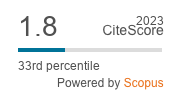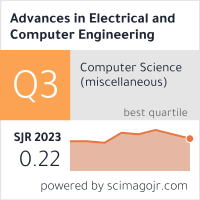| 4/2013 - 12 |
Low Complexity Approach for High Throughput Belief-Propagation based Decoding of LDPC CodesBELEAN, B. |
| Extra paper information in |
| Click to see author's profile in |
| Download PDF |
Author keywords
LDPC decoder, decoding algorithms, low-complexity, hardware implementations, belief propagation
References keywords
ldpc(17), codes(15), decoding(8), systems(6), decoder(5), turbo(4), communications(4), architecture(4)
Blue keywords are present in both the references section and the paper title.
About this article
Date of Publication: 2013-11-30
Volume 13, Issue 4, Year 2013, On page(s): 69 - 72
ISSN: 1582-7445, e-ISSN: 1844-7600
Digital Object Identifier: 10.4316/AECE.2013.04012
Web of Science Accession Number: 000331461300012
SCOPUS ID: 84890249314
Abstract
The paper proposes a low complexity belief propagation (BP) based decoding algorithm for LDPC codes. In spite of the iterative nature of the decoding process, the proposed algorithm provides both reduced complexity and increased BER performances as compared with the classic min-sum (MS) algorithm, generally used for hardware implementations. Linear approximations of check-nodes update function are used in order to reduce the complexity of the BP algorithm. Considering this decoding approach, an FPGA based hardware architecture is proposed for implementing the decoding algorithm, aiming to increase the decoder throughput. FPGA technology was chosen for the LDPC decoder implementation, due to its parallel computation and reconfiguration capabilities. The obtained results show improvements regarding decoding throughput and BER performances compared with state-of-the-art approaches. |
| References | | | Cited By |
Web of Science® Times Cited: 2 [View]
View record in Web of Science® [View]
View Related Records® [View]
Updated today
SCOPUS® Times Cited: 1
View record in SCOPUS® [Free preview]
View citations in SCOPUS® [Free preview]
[1] Secured polar code derived from random hopped frozen-bits, Moussa, Karim H., Shaaban, Shawki, El-Sakka, Ahmed H., Wireless Networks, ISSN 1022-0038, Issue 1, Volume 29, 2023.
Digital Object Identifier: 10.1007/s11276-022-03127-1 [CrossRef]
Disclaimer: All information displayed above was retrieved by using remote connections to respective databases. For the best user experience, we update all data by using background processes, and use caches in order to reduce the load on the servers we retrieve the information from. As we have no control on the availability of the database servers and sometimes the Internet connectivity may be affected, we do not guarantee the information is correct or complete. For the most accurate data, please always consult the database sites directly. Some external links require authentication or an institutional subscription.
Web of Science® is a registered trademark of Clarivate Analytics, Scopus® is a registered trademark of Elsevier B.V., other product names, company names, brand names, trademarks and logos are the property of their respective owners.
Faculty of Electrical Engineering and Computer Science
Stefan cel Mare University of Suceava, Romania
All rights reserved: Advances in Electrical and Computer Engineering is a registered trademark of the Stefan cel Mare University of Suceava. No part of this publication may be reproduced, stored in a retrieval system, photocopied, recorded or archived, without the written permission from the Editor. When authors submit their papers for publication, they agree that the copyright for their article be transferred to the Faculty of Electrical Engineering and Computer Science, Stefan cel Mare University of Suceava, Romania, if and only if the articles are accepted for publication. The copyright covers the exclusive rights to reproduce and distribute the article, including reprints and translations.
Permission for other use: The copyright owner's consent does not extend to copying for general distribution, for promotion, for creating new works, or for resale. Specific written permission must be obtained from the Editor for such copying. Direct linking to files hosted on this website is strictly prohibited.
Disclaimer: Whilst every effort is made by the publishers and editorial board to see that no inaccurate or misleading data, opinions or statements appear in this journal, they wish to make it clear that all information and opinions formulated in the articles, as well as linguistic accuracy, are the sole responsibility of the author.





